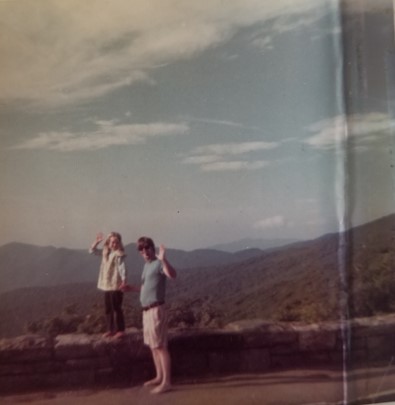Memories and Mountains
I’m always amazed at how memory shows up in the creative process. This photo (circa 1975) had been lost to me for decades. I recently found it and was surprised how the visual of the mountains resonates in the words from a short story I wrote just a few years ago:

Mitch looked into the distance. The mountains rippled on in succession, one behind the next, each a father to the one before, each protecting and shadowing the other. A legacy of hills, and dips, and curves. Each range a different shade of blue or green or gray but always resembling the next. He loved these damn mountains. (excerpt from my short story, Speaking of Harleys, published in Origins, June 2017).
While I don’t remember the specifics of this day, the photo is iconic of the types of family excursions we took. Our low-budget camping trips took us to places usually sandwiched between the eastern seaboard and the Blue Ridge mountains. We piled into the baby blue, Volkswagen bus with bikes and bags strapped to the roof. The Coleman camping equipment had been packed into the back and dozens of coloring books and crayons were scattered in the seats along side my brother and sister and me.
As I’m now entering middle-age, I’ve struggled with the memory tricks that my mind plays on me as keys and shoes seem to discover their own hiding places and what I ate for breakfast yesterday is gone to me forever! But it astounds me that those rippling blue mountains made its way into my writing consciousness from so long ago.
The working of the mind during the creative process is an unknown and miraculous force. Whether a comforting memory that seeps forward during times of stress or an unwelcomed memory that hurls forward without invitation, I marvel at what level of control our mind has for hiding or revealing memories.
Memories play such an important part of writing. But accessing them when needed is a challenge. I found that photos certainly help (and for that I continue to be grateful for Mom’s obsession with recording our childhood on film!) Meditation is also helpful to me as I discard the daily junk that clogs the memory pipeline. Conversations with family and friends to patch together the details can also be a lifeline for me when trying to access the lives lived so long ago. Dreams can sometimes surface a memory if only they weren’t so Van Gogh distorted. Marcel Proust brought us the concept of involuntary (or tea-biscuit) memory and Sigmund Freud brought us the suppressed wish for dream interpretation. All I’m asking for is to remember whether or not something happened as I’ve remembered, or if I’ve imagined or remembered it—or some combination of the two.
I’m not a neuroscientist but how memories are processed and resurfaced is intriguing to me. Selfishly, I would like to understand how to cultivate memories more easily for my own writing purposes. I suspect I need to obsess less about accuracy of the details and focus more their poignancy. For fiction, after all, is less about whether a thing is red or green and more about what the color means to the character. Could those blue hills be any other color and still have the relevancy to the story? Maybe that’s the point.



Here is a memory to put in the forefront of your mind… You are an amazing writer and your words are so eloquent! I think this blog is ready to be shared with all! This entry is probably one of my favorites so far!